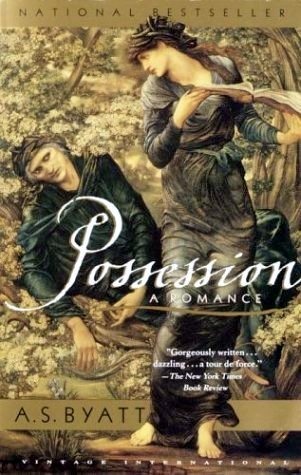Posession

Summary (from the publisher): Possession is an exhilarating novel of wit and romance, at once an intellectual mystery and triumphant love story. It is the tale of a pair of young scholars researching the lives of two Victorian poets. As they uncover their letters, journals, and poems, and track their movements from London to Yorkshire—from spiritualist séances to the fairy-haunted far west of Brittany—what emerges is an extraordinary counterpoint of passions and ideas.
Review: This novel is primarily set in London in 1986 and begins with Roland, a scholar of the (fictional) Victorian poet Randolph Henry Ash, who happens to uncover several previously unknown letters by Ash that seem to indicate that he may have had a relationship with a female poet. Roland, who is unemployed and unhappily living with the sour Val, is eventually connected with Maud, an academic who primarily studies the work of Victorian poetess Christabel LaMotte. Together, Roland and Maud uncover correspondence and revelations that reveal the true relationship between Ash and LaMotte, which is sure to alter the accepted academic opinions of both poets. In the process, they trigger a fight over ownership of the renowned poets' artifacts and become closer and closer to one another as they explore the two poets they both know so well. In addition to the 1980s narrative, this novel is full of poetry ascribed to both Ash and LaMotte, much epistolary content, and many flashbacks to the Victorian poets themselves.
Byatt works quite hard to either show off her intellect or establish the academic nature of her character's thinking - or both. The book opens with Roland researching Ash in the London Library, "His Proserpine was the corn, the origin of commerce and community. Randolph Henry Ash's Proserpine had been seen as a Victorian reflection of religious doubt, a meditation on the myths of resurrection" (5). This rather highfalutin narrative style was a bit off-putting and only minimally engaging at first blush. However, I managed to persevere, reeled in by the allure of the secret letters that Roland smuggles out of the library.
The "possession" of the title has a dual meaning, referring both to the state of being possessed and the object owned by another. There are multiple characters who are overtaken by a possession for another ("I have been in love with another woman. I could say it was a sort of madness. A possession, as by daemons. A kind of blinding." (492)) and there are also many possessions argued over and contested within this novel. In short, the title is supremely clever and well-suited to this novel. I was particularly intrigued by the question of who owns an academic discovery or theory, as well as who owns historical artifacts such as correspondence - particularly if it was never delivered to the recipient.
I do love the sort of treasure hunt that Roland and Maud embark upon in this novel to discover the untold story of Randolph Henry Ash and Christabel LaMotte. However, some of it did feel unlikely. For instance, despite being a private residence that previously warded off interested academics at gunpoint, Roland and Maud somehow make it into the Christabel's family home where - guess what! - her bedroom has "been closed since 1918" and where they just happen to uncover a cache of letters under some dolls after recalling one of her poems that talks about dolls hiding a secret (90). However, this treasure hunt lent great suspense and intrigue to the novel overall.
Byatt has taken immense pains to provide a rich depth to her story - writing poetry ascribed to both Ash and LaMotte, letters from Ash's wife, a journal from a cousin of LaMotte, correspondence of LaMotte's roommate, etc. This gave the novel great historical authenticity that made Ash and LaMotte feel like real historical figures. At times I did wish that the novel would commence with the main storyline instead of constant segues into the letters/writings/journals of others, but overall it only added to the suspense and characterization of the novel.
Stars: 4


Comments
Post a Comment